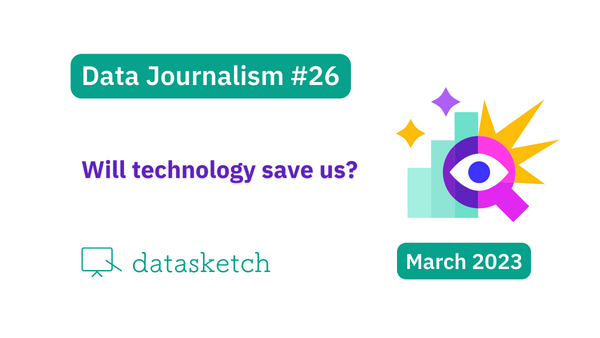Will Technology Save Us?
Conferences | Censorship | Internet Cuts | IA
Available in:

This issue is a collective call to harness the benefits of technology for the common good and to remain vigilant against its misuse. It is also the prelude to a very important event for Datasketch. Let’s get to it.
#NICAR23
Last weekend we were at #NICAR23, the IRE annual data journalism conference. We shared tips for not misrepresenting reality using data and the best ways to visualize data there. But, most importantly: we announced a release we’ve been working on for months, and you’ll soon hear about - only a few details remain, and we can’t wait any longer. 🚀✨
This kind of events fill us up, not only for the exchange of knowledge, but also for the networks they allow us to generate. A few months ago we were at Dataharvest in Belgium, today we are fully engaged in a project at Stars4Media together with Voxeurop and El Confidencial 😉.
While we process everything we experienced in Nashville and fine-tune the last tweaks of our next release, we share with you a project launched at #NICAR23 that we loved: moneyinpolitics.wtf. A collaborative, open-source dictionary of U.S. campaign finance jargon. You can request words to be added or add them yourself, are you up for it?
Fight censorship
Internet outages and censorship at critical times and places are a growing problem. We see them in protests, at election times and lately, they have even been used as a weapon of war.
Swissinfo has created a guide in 10 languages where you can avoid Internet censorship and surf safely. Hopefully, you’ll never have to use these resources for your own safety, but we’re glad they exist.
On the other hand, Access Now has created a course where you can learn about what is happening with the Internet cuts, how they are carried out, their purposes, and their harmful consequences on human rights and democratic processes. The contents talk about actions to show and face the problem.
In this sense, a project of the organization Internet Activism, which is carrying out the first tests to create an offline message sending system, has recently caught our attention.
Artificial Intelligence
This algorithm can ruin your life
More than 40 journalists tried for two years to access information about welfare benefit allocation fraud prevention systems based on predictive algorithms - or “suspicion machines” - in more than a dozen cities and countries. They met a wall in the face of their requests.
Rotterdam was the only city willing to share the code behind its algorithm, the variables on which it is based, its performance evaluations, the manual used by its data scientists and, in the face of possible legal action, the machine learning model capable of calculating the scores.
This allowed journalists to conduct an experiment that recreated and disassembled the machine learning algorithm. The results reveal inaccuracies, subjective, invasive, and banal assessments - such as those measuring people’s mental state or the length of their romantic relationships as risk factors—and, not least, discrimination based on ethnicity, age, gender, and parenthood.
The consequences of a flagging of possible fraud by this type of machine have drastic impacts on the lives of people who, like Imane, were flagged for investigation by the algorithm.
ON THE RADAR
-
🫧 Learn how to clean your data with the guide with examples and steps by Pritha Bhandari.
-
📈 The 30 Day Chart Challenge 2023 is about to start. Find out about the requirements and data.
-
🪖 El Confidencial publishes this manual for understanding the battle tank duel and its impact after a year of war.
-
🌎 #SaveTheDate This year’s Abrelatam and Condatos will be 10/31 to 11/03 in Montevideo, see you there?
-
🔎 #SaveTheDate The World Conference on Investigative Journalism will be September 19-22, 2023 in Gothenburg, Sweden. You can access early registration now.




